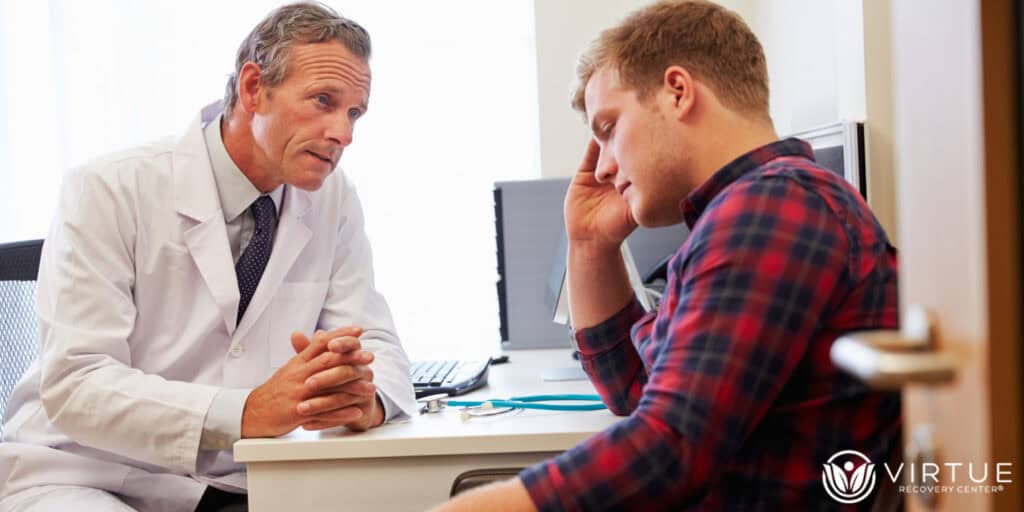
Table of Contents
Key Takeaways
- Ayahuasca, ketamine, and peyote are drugs that can have strange effects on the body and mind that require professional help.
- A medical detox center makes sure that withdrawal is safe, especially when hallucinogens cause trauma or psychosis.
- Many inpatient alcohol recovery programs also deal with poly-substance abuse, which includes addictions to hallucinogens and other behaviors.
- Trauma-informed counseling, psychoeducation group therapy, and relapse prevention therapy are all common forms of detox support.
Introduction
Ayahuasca, Ketamine, and Peyote are often viewed as spiritual or therapeutic tools, but using them without medical oversight can lead to psychiatric emergencies. According to the National Institute on Drug Abuse, these hallucinogens impact the brain’s serotonin system and can cause psychological dependence, dissociation, or a resurgence of trauma symptoms. A medical detox center is necessary when people have ongoing hallucinations, flashbacks, severe mood swings, or mental confusion. Inpatient programs offer 24/7 monitoring, emotional support, and a team of trained professionals who can handle the complicated withdrawal effects of psychedelics. This blog post talks about when and why you need to go to a professional detox after using psychedelics, especially if you also have problems with alcohol, trauma, or compulsive behaviors.What Makes Hallucinogen Detox Different?
Psychedelics don’t usually make people physically dependent like opioids or alcohol do, but they can make people feel very bad mentally and emotionally when they stop taking them. Some common signs are:- Persistent anxiety
- Dissociation (such as a “K-hole” from ketamine)
- Depersonalization
- Sensory disturbances (e.g., visual/auditory hallucinations)
- Mood swings and insomnia
When Should You Go to Inpatient Detox After Using Hallucinogens?
If you or someone you know has any of the following problems, think about going to a detox or inpatient recovery center:- After using psychedelics, you may have hallucinations, confusion, or psychosis.
- Trauma, depression, or anxiety is persistent or getting worse
- Using alcohol, stimulants, or benzodiazepines at the same time
- People who have behavioral addictions often have cravings or feel like they have to do something.
What Happens During Medical Detox?
 Most medical detox programs start with a psychiatric evaluation to understand the extent of emotional or cognitive disruption. Treatment may involve:
Most medical detox programs start with a psychiatric evaluation to understand the extent of emotional or cognitive disruption. Treatment may involve:
- IV fluids and nutritional support
- Anti-anxiety medications or mood stabilizers
- Sleep aids to correct sleep cycle disruptions
- Psychoeducational therapy to process the psychedelic experience
How Do Programs Address Trauma and Behavioral Addictions?
Many people turn to psychedelics as a coping mechanism for unresolved trauma or emotional voids, similar to how others may rely on gambling, disordered eating, or compulsive screen use. Medical detox centers address these root issues through:- Trauma-informed psychotherapy
- Mindfulness-based stress reduction
- Narrative or somatic therapies
- Relapse prevention therapy
What Happens After Detox?
 After detox, clients usually go to either inpatient rehab or structured outpatient care, depending on how bad their condition is. A good plan for after detox includes:
After detox, clients usually go to either inpatient rehab or structured outpatient care, depending on how bad their condition is. A good plan for after detox includes:
- Mental health and addiction treatment that work together
- Trauma therapy and help with dual diagnosis
- Therapy for families and help from the community
- Tools for preventing relapse, holistic therapies, and life skills education
Wie wirkt sich der kulturelle Kontext auf die Notwendigkeit einer medizinischen Entgiftung bei der Verwendung von Peyote aus?
Der kulturelle Kontext spielt eine entscheidende Rolle bei der Wahrnehmung und Verwendung von Peyote. In Traditionen, wo der Kaktus als heilig gilt, kann die medizinische Entgiftung anders bewertet werden als in westlichen Gesellschaften. Ein „kulturelles risiko peyote übernutzung“ kann entstehen, wenn diese spirituellen Praktiken nicht respektiert werden.
Conclusion
People often romanticize psychedelics like Ayahuasca, Ketamine, and Peyote as ways to reach enlightenment, but using them without supervision can cause mental health problems. Clients who are going through withdrawal, psychosis, or emotional fallout can be safely stabilized at medical detox centers. If you or a loved one is struggling after using psychedelics, especially in combination with alcohol or behavioral addictions, don’t wait for a crisis. Call Virtue Recovery Center at 866-461-3339. We offer medically supervised detox and compassionate, trauma-informed care designed to restore balance and clarity.Frequently Asked Questions
Do drugs like ayahuasca or ketamine make you addicted?
They don’t physically addict people like opioids do, but they can make some people mentally dependent and make them use them over and over again.What is a K-Hole, and is it bad for you?
High doses of ketamine can put you in a K-hole, which is a state of extreme dissociation. It can be scary or dangerous, and sometimes it needs to be addressed immediately.Do I Need to Detox If I Only Used Peyote Once?
Not always. But if you’re still feeling mentally bad, detox might help you feel better and get your thoughts and feelings back on track.How long does it take to get rid of hallucinogens?
It usually takes between 3 and 14 days, depending on the drug, the dose, and how the person reacts to it.Is inpatient rehab for alcohol helpful if I’ve also used hallucinogens?
Yes. Inpatient rehab programs often help people who abuse multiple substances and have other disorders at the same time, like those caused by psychedelics.Resource Links:
- National Institutes of Health. Psychedelic and Dissociative Drugs. NIH, 2023. https://nida.nih.gov/publications/drugfacts/hallucinogens
- National Institute of Mental Health. Substance Use and Mental Health. NIMH, 2024. https://www.nimh.nih.gov/health/topics/substance-use-and-mental-health
- Centers for Disease Control and Prevention. Youth High‑Risk Drug Use. CDC, Nov. 22, 2024. https://www.cdc.gov/youth-behavior/risk-behaviors/youth-high-risk-drug-use.html CDC
Are You Covered For Treatment?
At Virtue Recovery Center, we understand the importance of accessible care. That’s why we’re in-network with numerous private insurance companies, ensuring that your journey to recovery is supported from the start. Let us help you quickly and easily verify your insurance coverage. Begin your path to healing today.
- About the Author
- Latest Posts
Gigi Price( Clinical Director )
Gigi Price holds licenses as a Master Social Worker and Clinical Drug Counselor. She completed her master’s degree in Social Work at Texas State University. Over the last decade, Gigi has been dedicated to utilizing evidence-based practices to enhance patient care and treatment planning, resulting in positive, long-term outcomes for patients and their families. Her passion lies in creating a treatment environment where professionals collaborate to bring about positive change and provide a safe, trustworthy therapeutic experience. Patients can be confident in receiving top-quality care under her leadership.
In her role as the Clinical Director of Virtue Recovery Houston, Gigi conducted research to identify the most effective approaches for treating patients with acute mental health diagnoses, PTSD, and Substance Use Disorder. She then assembled a team of skilled clinicians who could offer various therapeutic modalities, such as Cognitive Behavioral Therapy (CBT), Dialectical Behavioral Therapy (DBT), Acceptance and Commitment Therapy (ACT), Somatic Exposure, Eye Movement Desensitization and Reprocessing (EMDR), and Cognitive Processing Therapy (CPT). Gigi takes pride in overseeing the development and implementation of Virtue Houston’s Treatment Program, which includes two specialized therapeutic curricula tailored to the unique needs of individuals struggling with mental health issues, addiction, and PTSD.
Key Takeaways Regular exercise reduces cravings and withdrawal symptoms. Physical …
Key Takeaways Veterans Day began as Armistice Day in 1918 …
Key Takeaways Proper nutrition plays a vital role in addiction …
Key Takeaways Long-term sobriety is achievable with evidence-based addiction treatment …
Key Takeaways Mindfulness and meditation improve focus, emotional balance, and …
Key Takeaways Family involvement greatly improves the success of addiction …


























